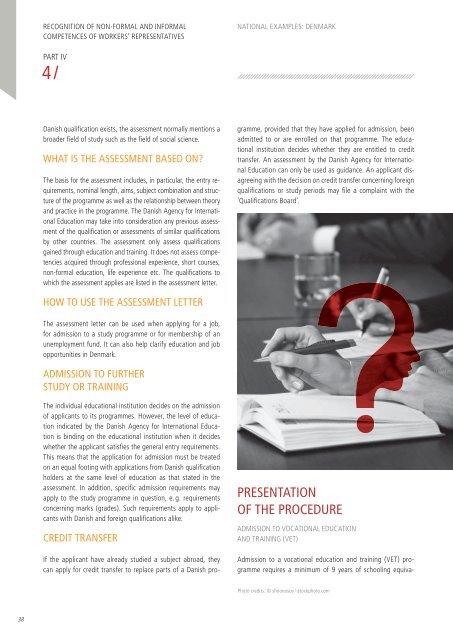RECOGNITION OF NON-FORMAL AND INFORMAL ... - Solidar
RECOGNITION OF NON-FORMAL AND INFORMAL ... - Solidar
RECOGNITION OF NON-FORMAL AND INFORMAL ... - Solidar
Create successful ePaper yourself
Turn your PDF publications into a flip-book with our unique Google optimized e-Paper software.
<strong>RECOGNITION</strong> <strong>OF</strong> <strong>NON</strong>-<strong>FORMAL</strong> <strong>AND</strong> IN<strong>FORMAL</strong><br />
COMPETENCES <strong>OF</strong> WORKERS’ REPRESENTATIVES<br />
NATIONAL EXAMPLES: DENMARK<br />
PART IV<br />
4 /<br />
Danish qualifi cation exists, the assessment normally mentions a<br />
broader fi eld of study such as the fi eld of social science.<br />
WHAT IS THE ASSESSMENT BASED ON?<br />
The basis for the assessment includes, in particular, the entry requirements,<br />
nominal length, aims, subject combination and structure<br />
of the programme as well as the relationship between theory<br />
and practice in the programme. The Danish Agency for International<br />
Education may take into consideration any previous assessment<br />
of the qualifi cation or assessments of similar qualifi cations<br />
by other countries. The assessment only assess qualifi cations<br />
gained through education and training. It does not assess competencies<br />
acquired through professional experience, short courses,<br />
non-formal education, life experience etc. The qualifi cations to<br />
which the assessment applies are listed in the assessment letter.<br />
gramme, provided that they have applied for admission, been<br />
admitted to or are enrolled on that programme. The educational<br />
institution decides whether they are entitled to credit<br />
transfer. An assessment by the Danish Agency for International<br />
Education can only be used as guidance. An applicant disagreeing<br />
with the decision on credit transfer concerning foreign<br />
qualifi cations or study periods may fi le a complaint with the<br />
‘Qualifi cations Board’.<br />
HOW TO USE THE ASSESSMENT LETTER<br />
The assessment letter can be used when applying for a job,<br />
for admission to a study programme or for membership of an<br />
unemployment fund. It can also help clarify education and job<br />
opportunities in Denmark.<br />
ADMISSION TO FURTHER<br />
STUDY OR TRAINING<br />
The individual educational institution decides on the admission<br />
of applicants to its programmes. However, the level of education<br />
indicated by the Danish Agency for International Education<br />
is binding on the educational institution when it decides<br />
whether the applicant satisfi es the general entry requirements.<br />
This means that the application for admission must be treated<br />
on an equal footing with applications from Danish qualifi cation<br />
holders at the same level of education as that stated in the<br />
assessment. In addition, specifi c admission requirements may<br />
apply to the study programme in question, e. g. requirements<br />
concerning marks (grades). Such requirements apply to applicants<br />
with Danish and foreign qualifi cations alike.<br />
CREDIT TRANSFER<br />
If the applicant have already studied a subject abroad, they<br />
can apply for credit transfer to replace parts of a Danish pro-<br />
PRESENTATION<br />
<strong>OF</strong> THE PROCEDURE<br />
ADMISSION TO VOCATIONAL EDUCATION<br />
<strong>AND</strong> TRAINING (VET)<br />
Admission to a vocational education and training (VET) programme<br />
requires a minimum of 9 years of schooling equiva-<br />
Photo credits: © shironosov / istockphoto.com<br />
38
















